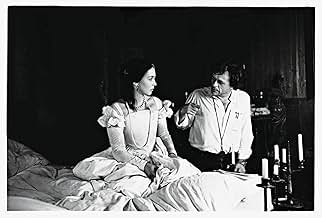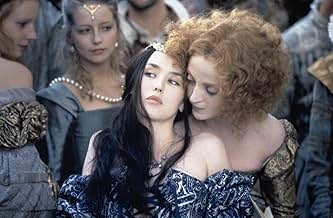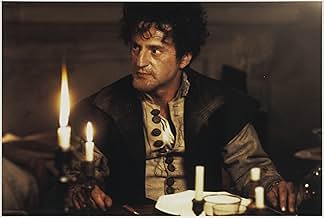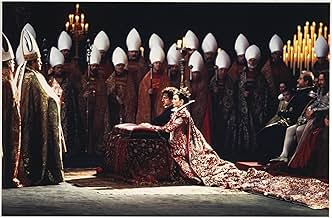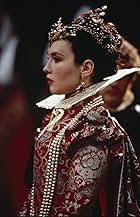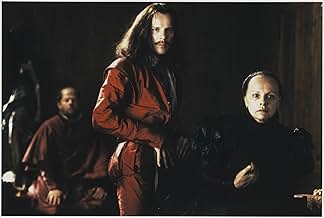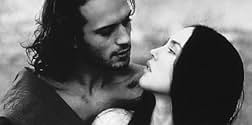La reine Margot
IMDb RATING
7.4/10
20K
YOUR RATING
Young Queen Margot finds herself trapped in an arranged marriage amidst a religious war between Catholics and Protestants. She hopes to escape with her new lover, but finds herself imprisone... Read allYoung Queen Margot finds herself trapped in an arranged marriage amidst a religious war between Catholics and Protestants. She hopes to escape with her new lover, but finds herself imprisoned by her powerful and ruthless family.Young Queen Margot finds herself trapped in an arranged marriage amidst a religious war between Catholics and Protestants. She hopes to escape with her new lover, but finds herself imprisoned by her powerful and ruthless family.
- Nominated for 1 Oscar
- 9 wins & 16 nominations total
Miguel Bosé
- Guise
- (as Miguel Bosè)
Jean-Philippe Écoffey
- Condé
- (as Jean-Philippe Ecoffey)
Featured reviews
The St. Bartholomew's Day Massacre---not exactly a subject the average person knows much about these days. But, a VERY important part of French and European history nonetheless. The history teacher in me will now BRIEFLY take over: Like England, there was a lot of tension between the Protestants (Hugenots) and Catholics during the 16th century. However, unlike Henry VIII's ultimate decision to break from the Catholic Church, the French pretty much wiped out the Hugenots--those who were not killed fled abroad. Up until St. Bart's Day, there had been tension but eventually the king granted religious freedom to all. This was not to last, as a conspiracy was hatched and on St. Bart's Day, thousands of Hugenots were murdered. To commemorate this event, the Pope issued a special medallion and ordered a celebration. Not exactly one of the finer moments in human history.
The movie concerns the machinations leading up to the event as well as portraying the massacre and the after effects. I'm not going to say more, as I don't want to spoil it for the viewer. However, I will say that the writing, acting and pacing of this film were excellent and kept my attention throughout. This fictionalized account of this true-life tragedy is compelling.
The movie concerns the machinations leading up to the event as well as portraying the massacre and the after effects. I'm not going to say more, as I don't want to spoil it for the viewer. However, I will say that the writing, acting and pacing of this film were excellent and kept my attention throughout. This fictionalized account of this true-life tragedy is compelling.
For the American people that have seen this excellent French movie, I will say just one thing: in many countries around the world we get to see movies from abroad with subtitles. Most of the movies that we see in South American countries come either from North America or Europe and we don't usually complain about the subtitles. Only kids movies are dubbed in Spanish. A great part of the romance or charm about French movies comes from the fact that they are actually spoken in French. Nobody in these films expects the rest of the world to understand as they speak but to make a little effort and appreciate the beauty in each language is something I think is missing in American culture. I've seen nothing but comments on how difficult it was for some members of the American public to understand this film. I only ask myself: in times of globalization, isn't it interesting to learn from people from other parts of the world in their own language, specially a French film based on a French novel by the French Alexandre Dumas, placed in the 16th century, directed by one of France's best directors and acted by some of the most wonderful French actors and actresses of the last decades? Would you want to see this film in English? Sorry, but I think you would be missing a great deal of the depth and emotion of this unique film!!!
I don't pretend to know the minutiae of the historical record, but it was Definitely Not Dumas, or I lost it all in the English translations! Like many others I've always been fascinated by this episode in French history, a turbulent and savagely intolerant period and not only in France, but 1572 is yet another year that went down in infamy. This film portrays the complicated machinations performed by Catherine de Medici and her cohorts in furthering her Catholic ambitions for her country and debauched family against the perceived threat of dour Protestantism, and centred around the St. Bartholomew Day Massacre.
It's the rather beautiful Isabelle Adjani's stunning performance as Queen Margot that can leave you as breathless as she often is in the film, without her it would have been a much poorer film. She seemed to live the part, with every emotion imaginable on display. Would French breathlessness, or those huge rustling dresses sound as good dubbed into English?! On the other hand the rest of the cast are superb in their roles too, but especially Daniel Auteuil as Henri de Navarre and Jean Hugues Anglade as Charles IX, making them both extremely believable sympathetic characters when they weren't. The bloodbath and the anarchy of the Massacre and aftermath is vividly presented we are not spared a single thing in the entire film, all manner of violence and depravity is non-gratuitously displayed. It's impossible to convey a part of what happens in this film the same as it must have been impossible for the film to convey a fraction of what happened in that era too: it really is a must-see. I've seen it a number of times now since 1994 and I find something new I hadn't spotted before every time. It's a film that can make you realise (if you didn't before) that millions of ordinary folk all around the world could and still can believe in such arrant religious nonsense to the point of committing multiple ghastly murders in the name of empty air.
Apart from all that, it's a beautifully crafted film, the best of its kind there's ever been.
It's the rather beautiful Isabelle Adjani's stunning performance as Queen Margot that can leave you as breathless as she often is in the film, without her it would have been a much poorer film. She seemed to live the part, with every emotion imaginable on display. Would French breathlessness, or those huge rustling dresses sound as good dubbed into English?! On the other hand the rest of the cast are superb in their roles too, but especially Daniel Auteuil as Henri de Navarre and Jean Hugues Anglade as Charles IX, making them both extremely believable sympathetic characters when they weren't. The bloodbath and the anarchy of the Massacre and aftermath is vividly presented we are not spared a single thing in the entire film, all manner of violence and depravity is non-gratuitously displayed. It's impossible to convey a part of what happens in this film the same as it must have been impossible for the film to convey a fraction of what happened in that era too: it really is a must-see. I've seen it a number of times now since 1994 and I find something new I hadn't spotted before every time. It's a film that can make you realise (if you didn't before) that millions of ordinary folk all around the world could and still can believe in such arrant religious nonsense to the point of committing multiple ghastly murders in the name of empty air.
Apart from all that, it's a beautifully crafted film, the best of its kind there's ever been.
French dynastic history in the late 16th century does not seem a promising subject for a film, but Patrice Chereau, a prominent French stage director, has teased out some personal drama out of the larger historical picture, and provided a vivid and absorbing tale. The story itself is adapted from Alexandre Dumas' novel, which is a pretty highly colored piece to begin with. Chereau theatrically plasters the set with blood and gore, and we are left in no doubt that an atrocity has occurred (the St Bartholomew's day massacre of the Hugenots.) The mendacious Queen Mother, Catherine di Medici, and her weak-minded son, Charles IX, seem to have set it off to deal with the protestant problem without realizing how bad it might get.
In all this horror is the rather cute tale of the relationship between two disparate personalities thrown together in marriage, Catherine's daughter Margo and Henry of Navarre (later Henry IV of France, and one of its better kings). Margo is repulsed at first sight by Henry `the peasant' while Henry rightly regards her as about as loving as a trapped tiger. Yet they reach an accommodation and finish up friends. Both have other lovers (and both respect that) but neither can prevent the lovers from coming to sticky ends.
It's always a bit hard to assess the acting when you are relying on sub-titles (if only the French didn't speak so fast) but Isabella Adjani at the age of 40 pulled off a remarkable job and had me convinced she really was a spoilt, willful little nymphomaniac in her early 20's. She looked as young as she did in the `Story of Adele H' 20 years earlier. Daniel Auteuil was also excellent as the unprepossessing but very intense and quick-thinking Henry. Virna Lisi, a sex symbol in her earlier film career, made a good villainess as Catherine. Most of the other principals seem to have been chosen for their looks by rent-an-ego casting though Jean-Huges Anglade was suitably pathetic as the doomed King Charles.
The rather claustrophobic sets brought home the medieval lack of privacy, even (perhaps especially) in royal palaces the old Louvre was about as spacious as the loo. The film fades a bit in the second half, but it's still not a bad story, if at times a bit difficult to follow. I have to say I found `Elizabeth' more interesting and a lot less bloody. Anyway, `Margo' is very French, and not to be judged by Hollywood standards (whatever they are).
In all this horror is the rather cute tale of the relationship between two disparate personalities thrown together in marriage, Catherine's daughter Margo and Henry of Navarre (later Henry IV of France, and one of its better kings). Margo is repulsed at first sight by Henry `the peasant' while Henry rightly regards her as about as loving as a trapped tiger. Yet they reach an accommodation and finish up friends. Both have other lovers (and both respect that) but neither can prevent the lovers from coming to sticky ends.
It's always a bit hard to assess the acting when you are relying on sub-titles (if only the French didn't speak so fast) but Isabella Adjani at the age of 40 pulled off a remarkable job and had me convinced she really was a spoilt, willful little nymphomaniac in her early 20's. She looked as young as she did in the `Story of Adele H' 20 years earlier. Daniel Auteuil was also excellent as the unprepossessing but very intense and quick-thinking Henry. Virna Lisi, a sex symbol in her earlier film career, made a good villainess as Catherine. Most of the other principals seem to have been chosen for their looks by rent-an-ego casting though Jean-Huges Anglade was suitably pathetic as the doomed King Charles.
The rather claustrophobic sets brought home the medieval lack of privacy, even (perhaps especially) in royal palaces the old Louvre was about as spacious as the loo. The film fades a bit in the second half, but it's still not a bad story, if at times a bit difficult to follow. I have to say I found `Elizabeth' more interesting and a lot less bloody. Anyway, `Margo' is very French, and not to be judged by Hollywood standards (whatever they are).
The timing of the release of this movie was sublime, if coincidental. I was living in France in the Spring of 1994 when this movie was released, so I got to see it on the big screen in Paris. It was quite chilling really: I was sitting in a theater watching the St Bartholemew's Day Massacre right in the midst of where it happened some 420 years earlier. Torture, mutilation, immolation, throwing naked bodies in the river, all because people were of the wrong group.
Then I went home to my apartment and when I turned on the TV, I got to watch torture, mutilation, immolation, throwing naked bodies in the river, all because people were of the wrong group. This time it was in Rwanda.
Catholics and Huguenots, Hutus and Tutsis, Seine or Nile, we haven't progressed very far in a half millennium.
The movie was a bit complicated, but it seemed to catch the the politics and the scheming that was taking place in the French court at the time as well as the horror of the massacre. But it is also a movie of our times: the message that civilization is only a hair-trigger away from from the most savage acts of barbarism. And that we haven't stopped even yet. The timing and the message were an accident, and made all the more vivid for it.
I highly recommend the movie for the performances but also for the message.
Then I went home to my apartment and when I turned on the TV, I got to watch torture, mutilation, immolation, throwing naked bodies in the river, all because people were of the wrong group. This time it was in Rwanda.
Catholics and Huguenots, Hutus and Tutsis, Seine or Nile, we haven't progressed very far in a half millennium.
The movie was a bit complicated, but it seemed to catch the the politics and the scheming that was taking place in the French court at the time as well as the horror of the massacre. But it is also a movie of our times: the message that civilization is only a hair-trigger away from from the most savage acts of barbarism. And that we haven't stopped even yet. The timing and the message were an accident, and made all the more vivid for it.
I highly recommend the movie for the performances but also for the message.
Did you know
- TriviaPatrice Chéreau edited the original cut of the film (roughly 160 minutes) to a shorter 138 minutes for international release. This was due to the disappointing box-office performance in France and the criticism (by, among others, Variety critic Todd McCarthy) of the film as being too violent and often incoherent. The French press were scathing of this 'American censorship' (they described the film as having been 'given a face-lift' for American audiences), but the new version was defended by various French critics being both more coherent whilst also maintaining Chereau's artistic vision. The shorter cut was later released in France too, in the hopes of increasing the film's box-office takings. 20 years later, Chereau slightly re-edited his film again and re-mastered it for a new BluRay release with a running time of 161 minutes. This was one of Chereau's last completed acts before his untimely death, so it can be regarded as the definitive version.
- GoofsLa Mole is shot in the legs and the wounds and bloodstains are visible as he goes to execution. But when Margot views his semi-naked corpse, his legs are unmarked.
- Quotes
Charles IX: One who gives life is no longer a mother once she takes that life back.
- ConnectionsFeatured in The 52nd Annual Golden Globe Awards (1995)
Details
Box office
- Budget
- DEM 42,000,000 (estimated)
- Gross US & Canada
- $1,304,237
- Opening weekend US & Canada
- $4,985
- May 11, 2014
- Gross worldwide
- $1,318,578
Contribute to this page
Suggest an edit or add missing content


